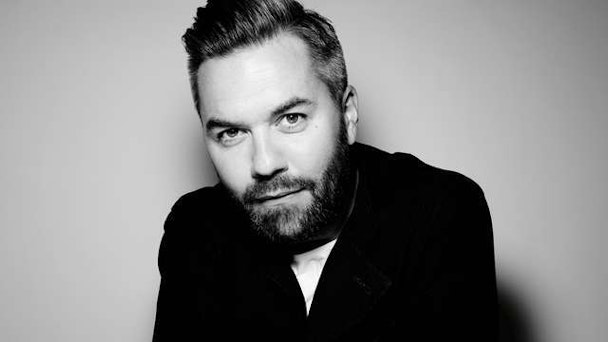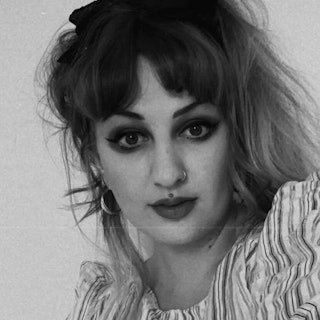My Creative Career: Nils Leonard, founder of Uncommon
As part of our My Creative Career series, the Uncommon founder talks us through his earliest inspirations, his first mentor, his need for heroes and how he no longer lets anyone tell him what to do.

Nils Leonard / Uncommon
Nils Leonard grew up in Wealdstone, north-west London, a place he remembers as a “bit of a shithole“.
With a tattoo artist father and a mother who was a teacher, however, he says home life was filled with creativity, but no one really called it that. “There were musical instruments everywhere, lots of music and tattoo flash all over the house.”
At school, he “kind of“ liked art and English (“they were the only things I was good at,“) but recalls that ”the rest of it was a bit of a shitshow”. “It wasn’t a particularly nice place to be and our circumstances weren’t great.”
It was a childhood that left him wanting two things – to “get the fuck out of there“ and to do something he loved. That drive to do the latter he attributes to his parents.
If he could have, he says he would have been an artist (or at least tried to be), but he didn’t believe it was possible to make money at it. “So I told myself this fictional story that advertising was like the slutty version of art,” he laughs. “Back in those days, you would go to the cinema and the fragrance commercials were actually good. They were big, artful, unexplained moments of the film that were just fucking cool and I thought, that’s wicked.”
Advertisement
Looking back, he says his initial interpretation wasn’t far from reality. “I wanted to chase that, so I went to the job center and said ‘advertising’ and they said they had never heard anyone ask for that, ever.”
Luckily, there was one position that fit the bill – a junior runner in the production department at an agency called Ammirati Puris Lintas. After turning up two and a half hours early for his interview, he got the job and would stay at the “big, shiny 90s agency” for four years learning the trade. “I got taken under the wing of someone brilliant there called Simon Fairweather and everything changed from there.”
Industry veteran Fairweather has led creative teams around the globe and is renowned for his print campaigns for luxury watch brand Rolex. “I look back and I’m aware how lucky I was that I even had an incline because so many people don’t understand themselves. There’s a lot of creative people who miss this whole career because they don’t think they’re creative or see it.”
Advertisement
Working within the production environment gave Leonard a taste for many disciplines as they were happening – the “different energies within an agency,“ as he puts it. “Design was super interesting. It was all very beautiful and crafted. They were ferocious.
“I’m eternally grateful to Simon. He didn’t just show me design, he showed me life. He showed me how to go to a restaurant and order food, how to behave in a meeting, how to dress for work. It was insane.”
There were lots of unwritten rules working in an office that a young Leonard simply did not know about. “He really invested in me to the point that it was a really powerful thing for me.”
Suggested newsletters for you
Grafting away, Leonard became a junior in the design department and attacked that role fiercely, learning as much as he possibly could about the practice. Drawn particularly to typography, he devoured every book on the topic he could get his hands on and found a hero in Richard Paul Lohse, the Swiss artist known for his colorfully imagined graphics. “Looking back, that’s an incredibly beneficial thing – there are very few typographers in our industry these days. That’s maybe what taught me the most, actually – you have to find heroes, people or bits of work that you wish you’d made.”
It’s a sentiment he’s carried throughout a career that has spanned ad agencies TBWA, AMV BBDO and Grey London. He wants to make work that matters, he says, recalling how he once went to a creative festival in Germany where there were a lot of blank gravestones on fly posters and someone had scrawled ‘content solutions’ on one of them. “Fucking hell,” he remembers thinking.
“There is a nagging feeling as a creative where you pour so much of yourself and your energy into what you do that you don’t want to believe that what you do is a four-out-of-10 cheese advert. So I thought, there’s got to be a better way.”
He points to a project called ‘Angina Monologues’ for the British Heart Foundation, which he made alongside advertising legend Vicki Maguire during their time together at Grey London, as one piece of work he’s particularly proud of. It was a comedy show starring Katy Brand, Victoria Wood and Jo Brand educating women on the dangers of heart disease. Another highlight for him is Volvo’s ‘Life Paint,’ which after winning big at Cannes Lions in 2016 was ultimately banned by the ASA.
“For a brief period, they mattered,” he says, adding that this is what drove him to establish his own creative agency, Uncommon London, in 2017 alongside Lucy Jameson and Natalie Graeme. “I want us to be a studio that matters in the world.” To date, its clients include Nike, ITV and B&Q and the campaign he prides above the rest is ITV’s ‘Get Britain Talking,’ a mental wellness project aimed at connecting people of different generations through conversations.
“We stopped national television – it was one of the most awkward and disruptive things I’ve ever been involved in. There was something like 15 million people watching on a Saturday night and you just stop the TV for two minutes.
“That campaign is now the most recognized mental health campaign in the country. We didn’t set out to do that. It’s about making that sort of difference, that’s the kind of work I’m proud of.”
While well-known for its advertising work, Leonard has always been keen to push traditional boundaries with the studio, which explains the feature-length Nick Cave film it produced last year exploring the singer’s creative relationship with Warren Ellis. “I saw it four times, like a fucking saddo. Of course I did. I’m sat there at the back of the cinema with a wine and the titles come up and it said: ‘produced by Uncommon’ and this guy four rows away said, ‘fuck Uncommon.‘ But I’d rather threats than silence.”
You get the sense that you can like him or not and he really doesn’t care, so long as the work stands up. It’s a thought process that the studio is founded on, an idea that came at Grey when during a client pitch he was asked how you create a brand that people wished existed.
“Name an agency that the real world wishes existed,“ he says, before quickly adding “there isn’t one“. “I was sick of being this kind of invisible advisor to clients. We’re better than that. We’ve forgotten to sell or market the thing that’s the most powerful, which is our creativity.”
It’s a job that never stops asking you things, he says, never stops presenting its challenges. There can be disappointment, barriers and a lack of money at times, but getting to make work that goes out into the world is the biggest payoff for creatives. “I love being under siege all day, coming up with ideas that we make and then there being 25 reasons not to do them, but you just fucking do it. That’s the fuel.
“You need to make yourself famous on your own, try to not need others to be impactful in the world. The biggest con in agencies is dependency. Don’t fall into the default position of getting someone else to do the work for you. Find like-minded crews, move fast, make yourself famous and don’t ever let anyone tell you that you can’t go out and do that.
“What will happen if you do that is that, eventually, you’ll just keep going and instead of people telling you what you can and can’t do, they’ll come begging for your attention.”
Read our interview with Ian Heartfield, founder of New Commercial Arts on his creative career.

